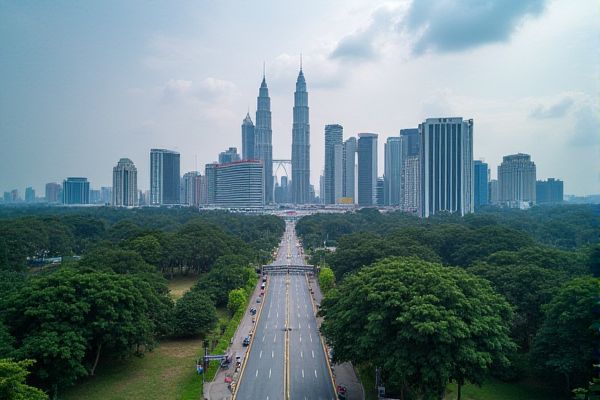
Local laws and regulations in Malaysia: Legal drinking age is 21. Drug offenses carry severe penalties. Mandatory seat belts for all passengers. Smoking bans in public areas. No littering; strict penalties apply. Public demonstrations require permits. Import restrictions on certain goods. Dual citizenship not recognized. Speed limits strictly enforced. Compulsory car insurance.
Legal drinking age is 21.
In Malaysia, the legal drinking age has been raised to 21 years from the previous age of 18, effective December 1, 2017. This change comes in conjunction with additional regulations, such as health warnings on alcohol products and specific rules for the sale of compounded hard liquor. For more detailed information, you can visit the official announcement on the Malay Mail website, which outlines the updated legal parameters and intended public health benefits. These measures aim to ensure a higher standard of public health and safety within the community.
Drug offenses carry severe penalties.
In Malaysia, drug offenses under the Dangerous Drugs Act 1952 carry severe penalties, including the death penalty or life imprisonment with whipping for trafficking. There is a presumption of trafficking if an individual is found in possession of a specified amount of drugs, despite recent legislative changes allowing for discretionary sentencing. For more detailed information on this subject, you can refer to the Dangerous Drugs Act which outlines these strict measures and the implications of drug-related offenses in the country.
Mandatory seat belts for all passengers.
In Malaysia, the use of seat belts is mandatory for all passengers, including those in the rear seats, as per the Seat Belt Laws enforced since January 1, 2009. Vehicles registered after January 1, 1995, must be equipped with seat belts for all seating positions, and non-compliance can result in fines up to RM 2,000 or imprisonment. For detailed information about these regulations, you can visit the comprehensive guide on the Seat Belt Laws on the Gem Car Rental website. Adhering to these requirements is crucial for ensuring passenger safety and avoiding legal repercussions.
Smoking bans in public areas.
In Malaysia, smoking is banned in 23 public areas, including restaurants, eateries, banks, theatres, hospitals, public vehicles, airports, and public parks, with a fine of up to RM 10,000 and up to two years of imprisonment for violators. Smoking is also prohibited within a 3-meter radius of these premises, and vaping is included in the ban. For more detailed information on the regulations, you can visit the Smoking in Malaysia page. Observing such stringent rules helps to maintain public health and mitigate the risks associated with secondhand smoke exposure.
No littering; strict penalties apply.
In Malaysia, littering is prohibited under various laws, including the Environmental Quality Act 1974, the Solid Waste and Public Cleansing Management Act 2007, and local Anti-Litter By-Laws. Penalties can range from fines of up to RM100,000 or imprisonment of up to 5 years, depending on the severity and location of the offence. For more detailed information, visit AskLegal Malaysia to understand the comprehensive legal implications of littering and the importance of maintaining a clean environment.
Public demonstrations require permits.
Under the Peaceful Assembly Act 2012 in Malaysia, public demonstrations do not require police permits, offering greater flexibility for organizers. However, it is mandatory for organizers to notify the officer in charge of the police district (OCPD) at least five days before the assembly occurs. This notification process allows the police to impose any necessary restrictions and conditions on the assembly. This framework aims to balance the right to [peaceful assembly](https://en.wikipedia.org/wiki/Peaceful_Assembly_Act_2012) with public safety considerations, providing a structured approach to managing public gatherings in the country.
Import restrictions on certain goods.
In Malaysia, import restrictions are stringent, prohibiting goods such as counterfeit currency, indecent media, devices harmful to national security, certain biological species, and specific agricultural products to protect public health, national security, and local industries. For those navigating the complexities of imports, understanding the specifics can be crucial. Restricted items, including agricultural and animal products, motor vehicles, and pharmaceuticals, require specific permits and licenses for importation. For a comprehensive understanding of these regulations, visit the Guide to Import to Malaysia and stay informed on the latest prohibitions and restrictions.
Dual citizenship not recognized.
Malaysia does not recognize dual citizenship; under Article 24 of the Federal Constitution, a citizen who voluntarily acquires citizenship of another country may be deprived of their Malaysian citizenship. This scenario, detailed on the Malaysian Nationality Law webpage, does not happen automatically and requires a formal process and sufficient evidence.
Speed limits strictly enforced.
In Malaysia, speed limits are strictly enforced through the Malaysian Road Transport Department, with default limits of 110 km/h on expressways, 90 km/h on federal and state roads, and reduced limits in high-risk areas. These regulations are accompanied by a tiered penalty system including fines and demerit points under the KEJARA system. For more detailed information on Malaysian speed limits and enforcement, visit the Gemcarrental Website.
Compulsory car insurance.
In Malaysia, car insurance is mandatory under the Road Transport Act 1987, with the minimum requirement being third-party bodily injury or death coverage. However, comprehensive coverage is highly recommended for broader protection. For more detailed information on this subject, you can visit the Bjak Blog for an in-depth understanding of the various types of car insurance available in Malaysia and their benefits.
